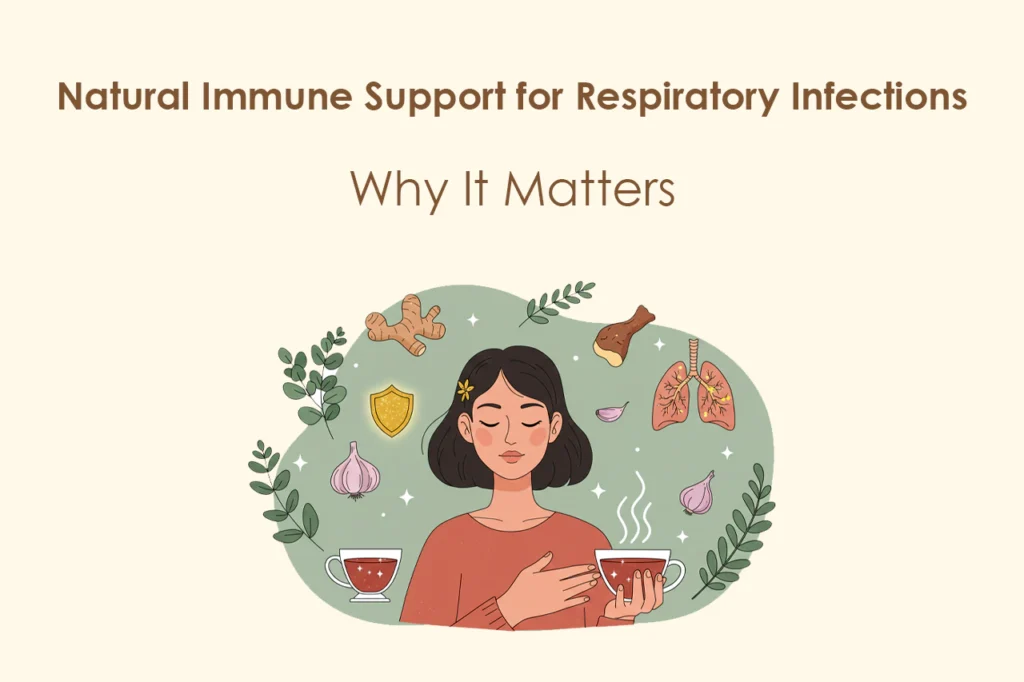Introduction
Respiratory infections, whether viral or bacterial, are among the most common health challenges people face, especially during seasonal transitions or times of immune suppression. While conventional medicine plays an essential role in severe cases, natural approaches can be extremely supportive in preventing infections, managing symptoms, and enhancing the body’s ability to recover.
Supporting the respiratory system naturally involves more than treating symptoms. It’s about strengthening the body’s defenses from within — using nutrition, herbs, targeted nutrients, and lifestyle habits that promote immune intelligence and reduce inflammation. This guide explores the evidence-backed tools that help you care for your lungs, throat, and immune system through nature’s pharmacy.
Healing Herbs for Respiratory Health
Herbs have long been recognized in traditional systems like Ayurveda, Traditional Chinese Medicine, and European herbalism for their ability to support the lungs and immune system. Scientific studies are increasingly confirming what ancient cultures knew intuitively: that the right herbs can modulate inflammation, fight pathogens, and ease symptoms of respiratory illness.
Thyme (Thymus vulgaris)
Thyme contains compounds such as thymol and carvacrol, which exhibit antibacterial, antiviral, and antitussive (cough-suppressing) properties. Clinical trials have shown thyme extract to be effective in relieving bronchitis and upper respiratory tract infections when used regularly. Thyme can be prepared as a tea, infused into honey, or added to warming broths.
Echinacea (Echinacea purpurea)
Echinacea is one of the most studied immune-modulating herbs. Research indicates that it stimulates the production of white blood cells, particularly macrophages and natural killer cells, enhancing the body’s ability to neutralize pathogens. It’s best used at the onset of symptoms and can be taken as a tincture, tea, or capsule.
Turmeric (Curcuma longa)
Turmeric is rich in curcumin, a compound with strong anti-inflammatory, antiviral, and immunomodulatory effects. A study published in Frontiers in Pharmacology noted its benefits in supporting respiratory tract health, particularly in reducing airway inflammation. For acute infections, combining turmeric with honey and ginger enhances absorption and delivers soothing relief for the throat and chest.
Ginger (Zingiber officinale)
Ginger acts as a circulatory stimulant and anti-inflammatory agent. It helps reduce chest congestion, ease sore throats, and break down excess mucus in the lungs. Active compounds like gingerol and shogaol also support digestion, which is closely linked to immune performance. Fresh ginger root can be simmered into tea or added to soups and immune tonics.
Garlic (Allium sativum)
Garlic’s therapeutic compounds, particularly allicin, have well-documented antibacterial, antiviral, and antifungal activity. Studies have shown that garlic supplementation can reduce the duration and severity of respiratory infections. Fresh garlic added to soups, and teas, or taken raw (finely chopped and mixed with olive oil or honey) can deliver these benefits efficiently.
Cumin (Cuminum cyminum)
Cumin seeds contain phytochemicals that have both antimicrobial and anti-inflammatory actions. Traditionally used to ease digestion, cumin also supports respiratory cleansing. It can help relieve congestion and soothe irritated airways. Toasting cumin and adding it to warm broths or steeping it into a digestive tea can support both gut and lung health.
Immune-Boosting Nutrients and Functional Foods for Respiratory Support
Nutrition plays a central role in strengthening immune function and supporting the body in its natural defense against respiratory infections. By focusing on nutrients that enhance immune cell activity and reduce oxidative stress, it’s possible to equip the body to face infections more effectively and without aggressive interventions.
Vitamin C: A Key Player in Immune Response
Vitamin C supports several aspects of immune function, including the activity of neutrophils and lymphocytes, two types of white blood cells critical in fighting infections. It also acts as a powerful antioxidant, reducing tissue damage caused by inflammation during infections.
Natural food sources rich in vitamin C include:
- Guava
- Kiwis
- Blackcurrants
- Broccoli
- Bell peppers
- Citrus fruits like oranges and lemons
A randomized study published in Nutrients (2020) found that higher vitamin C intake shortened the duration and severity of respiratory infections, especially in individuals under physical stress or with low baseline levels.
Zinc: Essential for Cellular Immunity
Zinc is involved in over 300 enzymatic reactions in the body, many of which are tied to immune defense. It helps activate T-cells and natural killer cells, which are responsible for identifying and eliminating infected cells.
Zinc deficiency is associated with longer recovery times and increased susceptibility to respiratory infections. Foods high in zinc include:
- Pumpkin seeds
- Chickpeas
- Cashews
- Shiitake mushrooms
- Spinach
Zinc is best absorbed when consumed with a small amount of fat and away from high-phytate foods, which may interfere with absorption. In cases of deficiency, short-term supplementation can be beneficial.
Vitamin D: The Immune Modulator
Vitamin D receptors are found on immune cells, and adequate levels are essential for regulating both innate and adaptive immunity. A deficiency in vitamin D has been linked with an increased risk of upper respiratory tract infections, particularly in winter months.
While the body produces vitamin D in response to sunlight, food sources include:
- Fortified plant-based milk
- Egg yolks
- Fatty fish such as salmon or sardines
- Mushrooms exposed to sunlight
Clinical evidence supports the use of vitamin D supplementation — especially in individuals with low levels — for reducing the frequency and severity of respiratory tract infections.
Colloidal Silver: A Cautious Option
Colloidal silver contains microscopic particles of silver suspended in a liquid. It has been used historically for its antimicrobial properties. Some in-vitro studies suggest it may inhibit bacterial growth and viral replication, though clinical evidence in humans remains limited.
If used, it must be done responsibly. Safe concentrations (under 30 parts per million) and short-term use are key. It may be used as a mouthwash or nasal spray, but long-term internal use is discouraged due to potential toxicity.
Raw Honey: Natural Soothing and Antimicrobial Action
Raw, unfiltered honey is rich in bioactive compounds like hydrogen peroxide, flavonoids, and phenolic acids. These substances support immune activity and reduce inflammation in the throat and upper respiratory tract.
Honey is especially useful in:
- Calming dry or irritated coughs
- Supporting restful sleep during illness
- Acting as a base for herbal infusions or pastes (like honey, turmeric, and ginger)
It’s important not to give honey to children under one year of age due to the risk of botulism.
Medicinal Mushrooms: Immune Support Rooted in Mycology
Mushrooms have been used for centuries in Eastern medicine for their immune-modulating and adaptogenic properties. Modern science confirms that many mushrooms contain beta-glucans, polysaccharides that stimulate white blood cell activity and enhance immune coordination.
Shiitake (Lentinula edodes)
Rich in lentinan, a compound known for its antiviral and antibacterial action. Shiitake supports the activation of macrophages and T-cells. A clinical study published in the Journal of the American College of Nutrition found that daily consumption of cooked shiitake improved immune markers in healthy adults.
Reishi (Ganoderma lucidum)
Known as the “mushroom of immortality” in Traditional Chinese Medicine, reishi enhances immune regulation while helping calm inflammation and oxidative stress. It may reduce cytokine overactivation, making it relevant during viral respiratory infections.
Chaga (Inonotus obliquus)
This fungus grows on birch trees and is high in antioxidants like polyphenols and melanin. Chaga may help reduce inflammation and support cellular defense mechanisms. It is best consumed as a decoction or powder in teas or broths.
Lion’s Mane (Hericium erinaceus)
In addition to its cognitive benefits, Lion’s Mane supports gut health, which is intricately linked to immune resilience. Research suggests it helps reduce systemic inflammation and supports the nervous system, which plays a key role in immune coordination.
Mushrooms can be consumed in powdered extracts, capsules, or added to smoothies and soups. Cooking them breaks down the cell walls, increasing nutrient bioavailability.
Essential Oils: Inhalation as Immune Support
Essential oils offer both direct antimicrobial action and indirect immune support through the respiratory and nervous systems. When inhaled, these oils can influence mucous membranes, reduce inflammation, and improve breathing comfort.
Peppermint (Mentha piperita)
Contains menthol, a natural compound that helps relax the bronchial muscles and open airways. Clinical trials have shown its usefulness in reducing congestion and soothing dry coughs. Peppermint oil can be diffused or applied topically when diluted.
Lemon (Citrus limon)
Lemon essential oil has mild antimicrobial effects and can support lymphatic drainage and respiratory cleansing. It blends well with other oils and can promote a refreshed breathing experience when diffused.
Frankincense (Boswellia carterii)
This resin-derived oil reduces airway inflammation and supports mucosal health. Some studies also suggest immunomodulatory effects that may assist in reducing excessive immune activation during infection.
Lavender (Lavandula angustifolia)
Beyond its calming properties, lavender oil helps reduce stress-induced immune suppression. Chronic stress weakens immune defense, and lavender may help restore balance via the nervous system.
Application methods include:
- Diffusing oils in a well-ventilated space
- Inhaling from palms after diluting with carrier oils
- Massaging diluted oils onto the chest or neck (avoiding direct contact with mucous membranes)
Always patch-test and follow age-appropriate safety, especially when using essential oils with children or during pregnancy.
Broths: Foundational Nourishment for Respiratory Wellness
Homemade broths are more than comfort food — they serve as mineral-rich, hydrating, and immune-supportive meals when fortified with herbs and warming spices.
Benefits of Therapeutic Broths:
- Provide glycine and collagen for tissue repair
- Deliver easily absorbable minerals like calcium, magnesium, and phosphorus
- Support hydration and mucus clearance
- Improve gut barrier integrity, which enhances immune regulation
Ingredients to Include:
- Garlic, ginger, and turmeric to reduce inflammation
- Thyme and cumin for their decongestant and antimicrobial effects
- Onions and leeks for sulfur compounds and immune-priming properties
- Sea salt and lemon for electrolyte balance and alkalinity
You can make bone broths using beef or poultry bones simmered for 12–24 hours, or plant-based broths using mushrooms, root vegetables, seaweed, and herbs. Sipping broth throughout the day supports hydration, eases digestion, and nurtures the body during recovery.
Final Tips for Respiratory Resilience
To support your respiratory system and overall immune strength naturally, consistency and care matter more than intensity. These daily habits can make a meaningful difference:
- Stay well-hydrated with filtered water, herbal infusions, and nourishing broths
- Support your gut through fiber, fermented foods, and anti-inflammatory herbs
- Use warming herbs and spices like ginger, garlic, turmeric, and cumin in meals
- Inhale essential oils through diffusers or diluted applications for decongestion
- Prioritize sleep and recovery, as immune cells regenerate during deep rest
- Avoid inflammatory foods such as ultra-processed items and excess sugar
- Gargle with salt water during sore throat or early symptoms to reduce viral load
Natural respiratory care is not a replacement for medical treatment when needed, but it can be a powerful, science-informed way to support healing and prevent frequent illness. By including these time-tested remedies in your lifestyle, you empower your body to defend, repair, and thrive.





